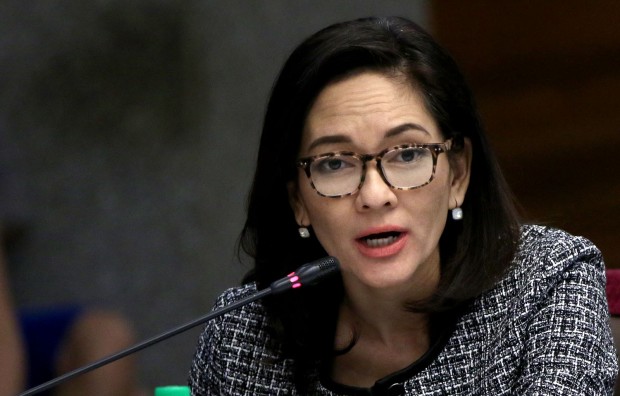Hontiveros: Existing laws can suppress terrorism, rebellion in Mindanao

Senator Risa Hotiveros.
INQUIRER FILE PHOTO / RICHARD A. REYES
Senator Risa Hontiveros on Saturday raised the possibility that government forces can enforce a crackdown on terrorism and rebellion even without the implementation of martial law in Mindanao.
This after Hontiveros questioned the need to extend President Rodrigo Duterte’s martial law in Mindanao when there are existing laws that would allow the military and police to neutralize terror groups.
During the interpellation in the House of Representatives where Congress convened in a joint special session, Hontiveros cited the Human Security Act and the Revised Penal Code, which enforces strict penalties against terrorists and rebels.
Hontiveros said these laws the Armed Forces of the Philippines (AFP) may use to crack down on rebels and terrorists without the need to impose martial law in Mindanao.
“Hindi ba itong pagkamit ng AFP objectives, hindi ba ito posible sa ilalim ng ibang batas? (Isn’t it that the AFP can achieve its objective possibly under the other laws?)—Human Security Act, which increases the power of the state against terrorism, and the Revised Penal Code, (where) warrantless arrests can be effected without martial law, considering that rebellion is a crime,” Hontiveros said.
Article continues after this advertisement“What does martial law confer that other laws do not, para patuloy nating makamit ang ating (so that we can continue to achieve our) AFP objectives?” she added.
Article continues after this advertisementNational Security Adviser Hermogenes Esperon said the Mindanao martial law is an “added tool” for the government troops to arrest suspected rebels and terrorists.
He added that government troops may still use such laws as the Revised Penal Code and the Human Security Act, noting however, that implementing some provisions of the Human Security Act would require proceedings in court.
“Indeed, in fulfilling the task on the ground, they (troops) can always use or avail of the provisions of the Revised Penal Code and the Human Security Act. But in the application of the Human Security Act, you will always go through the course. …the provisions of the Human Security Act will have to go through the court. You can’t always avail of the courts given the situation,” Esperon said.
“The provisions of martial law will be an added tool to our soldiers, to policemen. And if we are to arrest them (terrorists and rebels) immediately as fast as we could… if we are to impose curfew, we would appreciate if you arm us with what is provided by the powers of martial law,” he added.
Esperon bristled at Hontiveros’ question on what civilian liberties the military took over since martial law was imposed, which for him seems to imply that Duterte’s martial law is similar to the martial law which cemented the two-decade dictatorship of former President Ferdinand Marcos.
Esperon said Duterte’s martial law is different because democratic institutions such as the courts, Congress, and local government units remain functional despite the martial rule in Mindanao.
“This is again looking back at another type of martial law. We have the local officials, they are still there, the courts are functioning. We have not suspended anybody there. They are helping us, we are helping each other. Congress is in session,” Esperon said.
“The martial law we had now is to protect the people of Mindanao,” he added.
Congress convened Saturday to tackle Duterte’s request to extend martial law in Mindanao. His martial law proclamation is set to expire today July 22, after the 60-day period prescribed in the 1987 Constitution. JPV